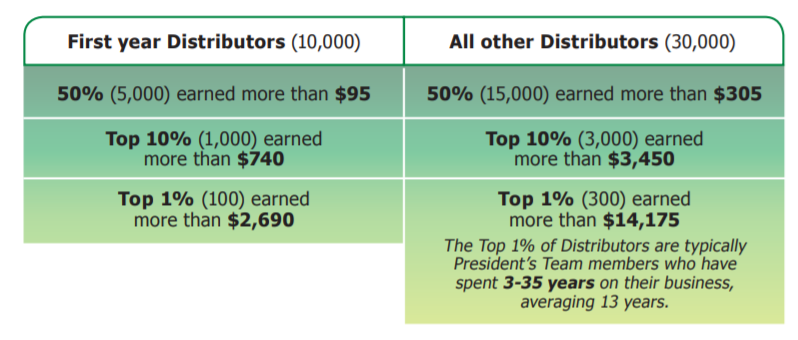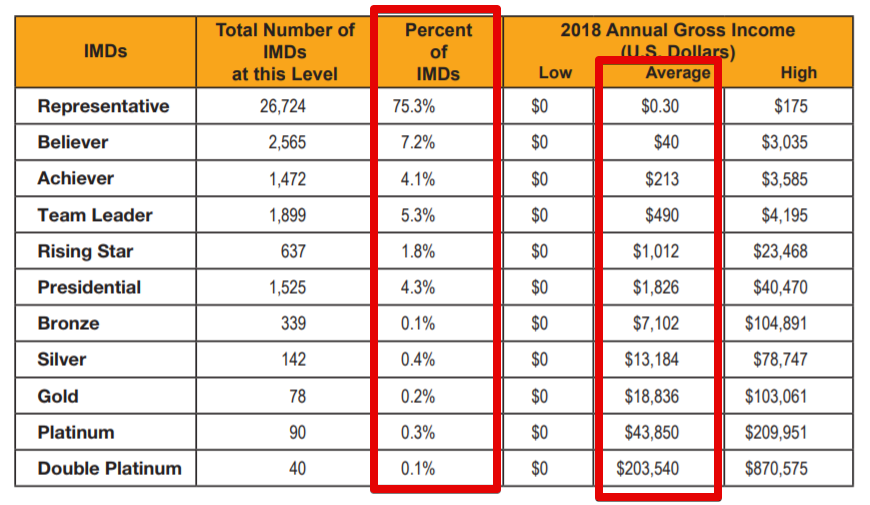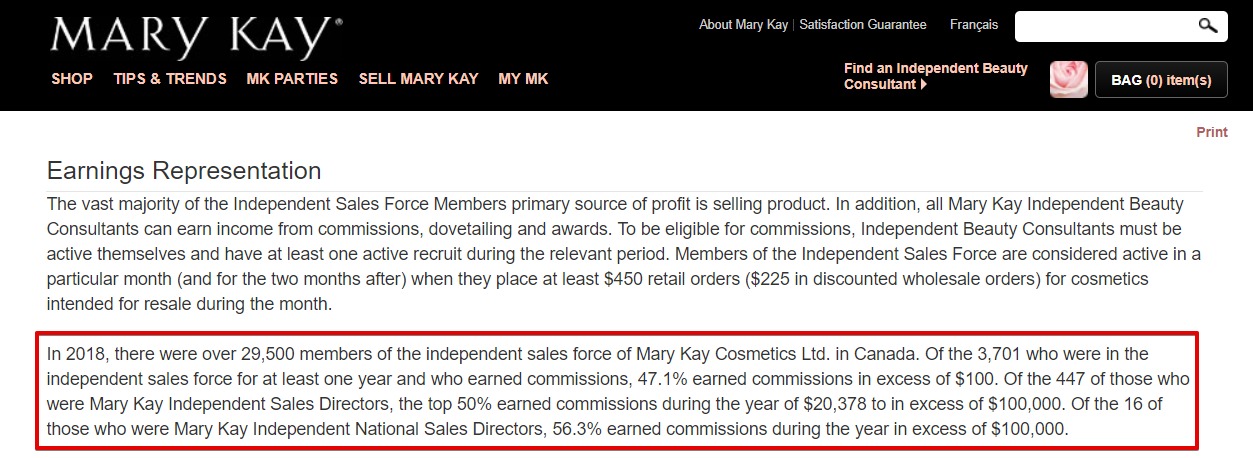The terms network marketing and multi-level marketing seem to be used pretty much interchangeably... but what is the difference between the two, if any?
Is a network marketing opportunity the same exact thing as a MLM (multi-level marketing) opportunity?
In this network marketing vs multi-level marketing comparison I'll be breaking things down for you so that you know what the difference is.
Yes, there is somewhat of a difference... and you'll see why.
So let's first start off by going over what network marketing is... then we'll work our way to MLM...
What Is Network Marketing?
Network marketing is a marketing approach that some businesses use where they allow independent distributors (aka reps) to take care of all the marketing. These distributors have the ability to recruit other individuals into their "network" and can build a team, so to speak, of reps.
It can be a great business model for both individuals and companies because anyone can join in on the opportunity and the company doesn't have to worry about advertising costs and all that jazz.
Direct Selling
Network marketing opportunities always use the direct selling business model, where representatives go out and sell the products directly. There is no need for retail stores or anything of this nature.
These types of opportunities are ones that anyone can join in on. Anyone can join them as a rep and start their own home-based business selling the companies products. Much of the time there is training that you must go through so that you know how to represent the company in a good light, and sometimes you are required to purchase a "starter kit" that provides an array of the products you will be selling.
Recruitment
Let's talk a little more about recruitment and building a "network" because this is an important aspect of the business.
As a representative you can go out and recruit other people to become representatives as well, and then they can go out and recruit others in beneath them. This is how the network grows...

The point of recruitment is to build your team, or network, and of course make more money.
Commission structures vary depending on the network marketing company, but they all follow some sort of pyramid-like pass-up commission structure, where commissions will flow up the pyramid.
So if you recruit someone into the business, you then earn a commission based on what they earn, and what the person that they recruited in earns, and so on.
A Good Business Model?
There are definitely some downsides to this type of business model, but it can be very attractive as far as income is concerned and this is the reason you see some more traditional businesses switching over to it.
Just think about it… The independent distributors are taking on all the costs of advertising, which can be huge, and there is also no need to sell in retail stores which also takes a massive cut out of profits.
But the business model is often more attractive to the business itself, rather than the potential individuals looking to join as representatives. As I will go over shortly, while there is good income potential for a lot of network marketing opportunities, statistics don't lie and numbers often show that the overwhelming majority of people make very little money.
That said, the fact that anyone can get a crack at such an opportunity and potentially make some decent money is plenty of incentive to get people to join.
What Is MLM?
The basics...
- Reps make money selling products directly to consumers
- Reps make money recruiting other reps in and earning commissions from what they earn
The basics are the same, but MLM it's kind of like a layer added onto a network marketing business where there is more focus placed on recruitment of new representatives and overall it's just more focused on recruitment, or at least that is how many people see it.
I once heard the saying that "MLM is network marketing on steroids" and this is something that I cannot argue with.
With MLM opportunities, just as network marketing opportunities, your goal as a representative is to make sales directly to consumers as well as to recruit in other representatives beneath you that will make up your "downline". And, you will earn commissions from those people that have been recruited in beneath you, whether they were recruited in by yourself or by other members of your downline.
Compensation plans vary, but with many MLM opportunities there will be "teams" that form in your downline once one person starts to build a large downline themselves. There can be teams that form beneath teams where the downline branches out and becomes massive.
With the incentive to recruit more people in and earn more commissions as you build a larger downline, the growth and expanse potential for a MLM is huge.
Differences?
Both network marketing and MLM's have recruitment of other representatives as a core part of their business model. Of course there is also something is on actually selling products to the general public, because it is only the selling of real products that separates opportunities like this from pyramid schemes, but the focus definitely seems to be on recruitment with much of these opportunities.
It is arguable whether or not there is any real difference between the 2 terms, but all in all it seems that those referred to as "MLM" are more "roided out".
A company that pays down 3 levels deep is more likely to be called a network marketing opportunity than a company that pays down 10 levels deep.
The Merging of Terms
It seems that network marketing was the original term used and then slowly "MLM" started working its way into the space, and has pretty much taken it over at this point.
At the same time that MLM came more into the space, we have seen more and more companies with deep reaching compensation plans, lots of fancy bonuses, more focus on recruitment than ever, and so on.
This all makes sense and goes along with my argument… Which is that they are basically the same thing just the opportunities that are called "MLM" or more geared toward large fancy recruitment commission structures with plenty of confusing bonuses to make opportunities sound better than they really are.
Again... "MLM is network marketing on steroids".
Pros v Cons
Pros
- Anyone can joined the opportunity - As already mentioned, opportunities like this usually don't have any requirements other than maybe purchasing some sort of "starter kit" and/or going through a bit of training. It is not like you need a degree or anything of that nature.
- Lots of income potential - The pyramid-like structure that these opportunities use in their compensation plans creates lots of income potential. If you are able to build a large foundation of representatives beneath you then you will be able to earn more and more commissions. This is what is so enticing about these sorts of opportunities.
- Low startup cost - Some network marketing/MLM opportunities are free to get started with, but most require you to make an initial purchase to get started. All in all, the cost is extremely low when you actually think about it. You are able to start your own home-based business without actually starting your "own" business.
- Flexible Schedule - Of course one of the big pros that comes with this line of work is that you can work whenever you feel like it. There is no set schedule or required number of hours that you work. You work on your own time and reap the rewards from the amount of time and effort you put into it.
Cons
- You might have to "bug" people - If you are serious about an opportunity like this then you more than likely are going to have to bug and pester people into buying products or joining the opportunity. You might have to develop somewhat of that annoying salesperson-type personality, which might be out of your comfort zone.
- Rejection can hurt - You will get rejected a lot when trying to sell products and recruit people in, but you're just going to have to take it and keep moving forward. This is something that can take some getting used to and might be hard to deal with at first.
- High turnover rate - Network marketing/MLM opportunities are notorious for having incredibly high turnover rates, meaning high rates of representatives joining and then quitting soon after.
- Most people don't make much money - Going along with the high turnover rates, most people don't make much money in these types of businesses. This may seem surprising because these opportunities are often presented as the greatest things to ever bless this earth, but the reality is that very small percentages of people actually make good money and I will go over more of this soon.
Is Network Marketing/MLM Right for You?
One thing that you absolutely must understand before getting started in something like this is that YOU WILL HAVE TO RECRUIT.
As you already know, there are 2 main ways to make money here: You can sell products directly or you can earn commissions from people you have recruited in. Selling products directly can be a good way to make money when you are starting out, but if you want to earn substantial money then you want to focus more on recruitment, earning commissions from people beneath you doing the groundwork selling.
Most compensation plans force you to recruit more people in order to make good money. They will require you to have a certain number of representatives beneath you before you move up to the higher ranks, which unlock more of the compensation plan and allow you to earn deeper commissions.
Recruitment is key and that is all there is to it.
The Problem With Many Such Opportunities
There is a lot of incentive for companies to go with a business model like this. It can save them a lot of money and will lead to fast and rapid growth with very little effort. However, there are some downsides.
One downside that I see all the time is representatives that go "rogue". Sometimes you will see representatives being a little to over-the-top "salesy" and aggressive. This gives the company a bad image and just doesn't look good. It is also a turnoff and makes the whole thing seem like a scam.
Another problem that I also see is that these sorts of opportunities often develop cult-like beliefs. Because of their large focus on recruitment and aggressive sales tactics, they are often accused as being scams and pyramid schemes (more on this), and if called such you will often see representatives defend their business until the bitter end. If you dare step into the circle and make a negative remark about such a business, you better be ready to defend your case.
And of course there is the other downside of the opportunities just looking way better than they really are, because of the very low amount of people that actually make good money with them.
Pyramid Schemes... What's The Difference?
I know there are probably plenty of people wondering the difference between network marketing/MLM opportunities and pyramid schemes. After all, they all have a recruitment-focused business model that have a pyramid -like commission structure.
So are these pyramid schemes or not?
The answer is NO, well at least not most of the time. There have been quite a few business opportunities over the years that have fallen into the realm of pyramid scheme status, and have been shut down, but most are not.
The Main Difference
The main difference between a legitimate opportunity and a pyramid scheme is the sale of legitimate products to the general public.
A pyramid scheme in its pure form has no products and relies solely on recruitment of new individuals into the scheme. However, the line between what is legitimate and what is not is a little more blurry. It is not so cut and dry.
A business can sell products, legitimate products, but if they are too focused on recruitment they still run the risk of being labeled a pyramid scheme by the FTC, and possibly facing legal action.
The part where there are legitimate products being sold to the "general public" is a big deal. You often see such opportunities requiring new recruits to purchase products packages. Sure, there are some products here, but the products that they are selling are being forced down someone's throat and that someone is a recruit that is joining the opportunity, not someone who is purchasing products because they actually want them.
Income Stats - The Brutal Reality
I find it fitting to close out this article with some brutal income statistics that might blow your mind.
Now I definitely don't want to give the impression that you cannot make money with these opportunities, because there is plenty of income potential, but I do want to give you a realistic look at what you might be getting yourself into.
It will be difficult. Most people fail. And here's the proof…
*Note: A a lot of times companies provide earnings disclosures that are confusing and don't really paint a very clear picture as to how much money people are making. I will do my best to break it down so that you can see what is really happening.
Herbalife Earnings Disclosure:
First up is Herbalife, which is one of the most well-known opportunities out there. Below you can see an image of their 2017 earnings disclosure. Now I know this is a bit old, but it is always pretty much the same every year.
50% of their first year distributors earned more than $95, meaning that the other 50% earned less than $95. The top 10% earned more than $740, meaning that 90% earned less than $740. And the top 1% earned more than $2690, meaning that 99% earned less than that.
For the 30,000 other distributors that were not first year distributors: only 1% earned more than $14,175.

It's probably a lot worse of an opportunity than you are expecting. This is one of the biggest network marketing/MLM businesses out there and only 300 out of 40,000 distributors made more than $14,175 within the entire year.
Team National's Earnings Disclosure:
Team National is another big business out there and their 2018 earnings disclosure pictured below is a mind-boggling.
As you can see, 75.3% of all of their representatives made an average of $0.30 for the entire year. And you can see the incredibly low percentage of people who even made more than $1000.

One thing that I will give Team National credit for is that they presented this earnings disclosure in a very clear and concise format. They certainly didn't try to mislead viewers or try to make the opportunity look better than it is.
Mary Kay's Earnings Disclosure:
Mary Kay had over 29,500 members in their independent sales force in 2018 (in Canada alone). Only 3701 people were part of the sales force for at least a year (due to high turnover rates). Of those 3701 people, only 47.1% earned more than $100 in commissions.
They did have some people who earned over $100,000 in the year, but that was only 56.3% of 16 people, which is about 9 people total.

And these are just 3 examples of the many that I could be giving you right now.
It is the same story across the board.
The reason for this is because of the pyramid -like commission structure. In fact, it it's pretty much impossible for the earning disclosures to not be like those shown above. Commissions flow up the pyramid-like structure from those at the bottom to those at the top and this creates a very uneven income distribution where the very small percentage of people at the top make the majority of the money.
What do you think about this all? Do you think opportunities like this are still worth joining? Leave your comments below…


Hi Kyle,
I find your article quite informative. I have been a part of a few MLM companies and will acknowledge that your comments about the success rates of participants are factual.
A new up coming company though have tweaked things a bit. In this case participants do not need to do sales or recruiting and still earn a much better income potential than traditional MLM. In fact monthly authorship is paid out of profit and not out of pocket This is a real gamechanger. Because of it’s radically new approach many persons make wrong assumptions by comparing it to traditional MLM. You need to check this out for yourself.